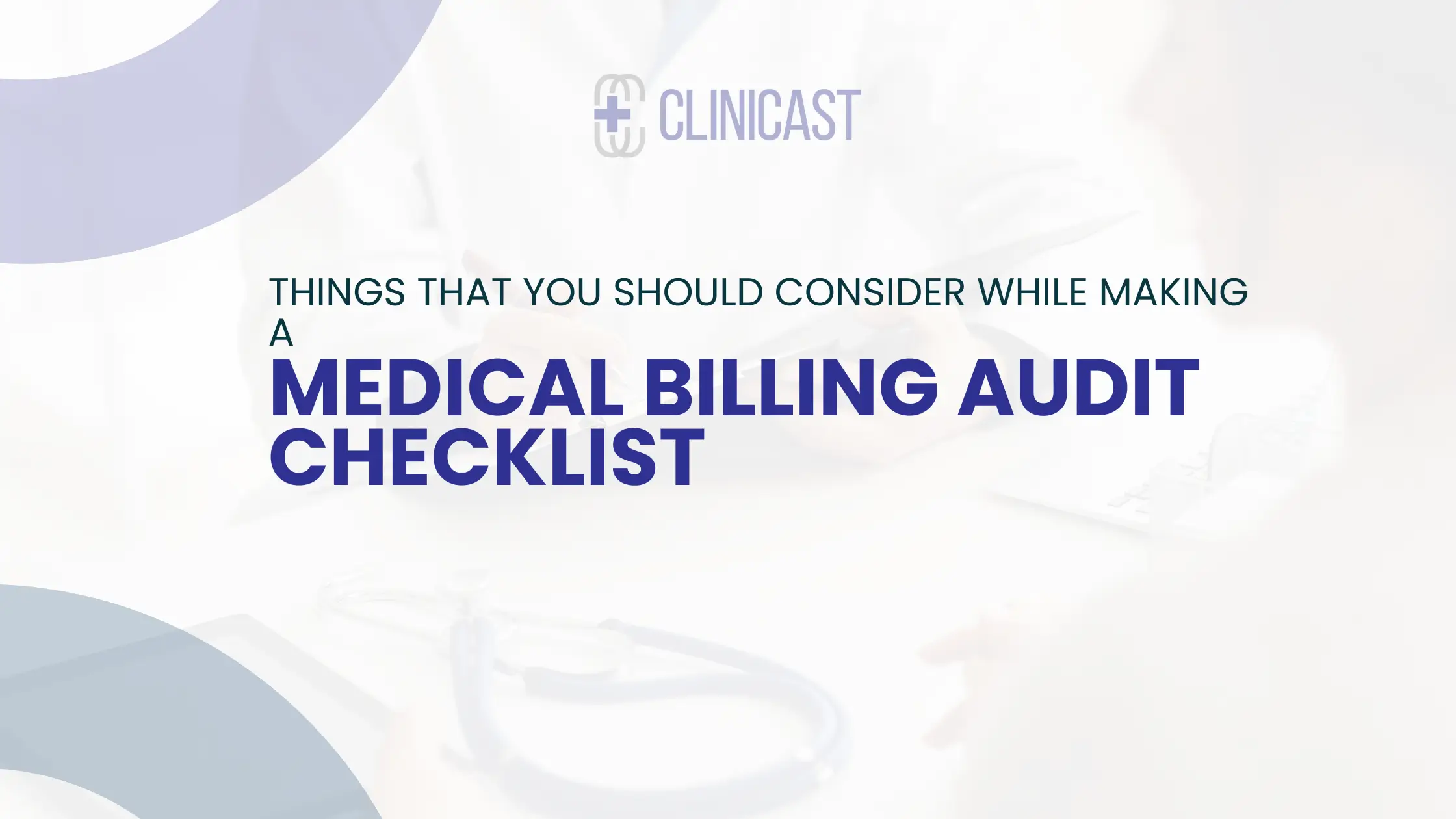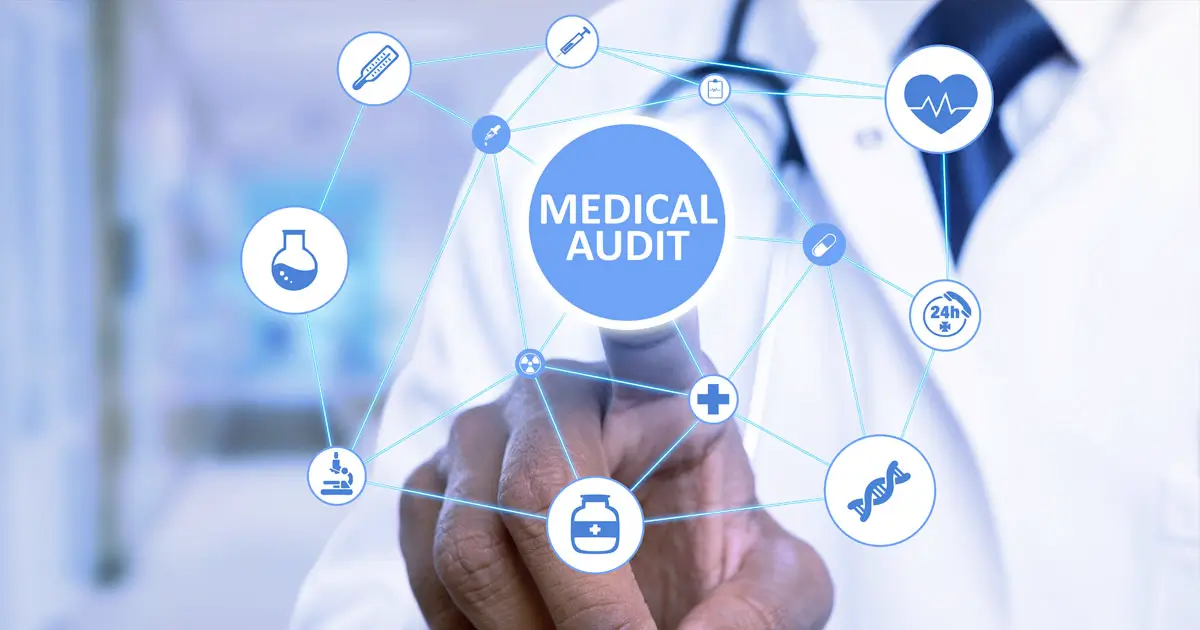For any organization that requires accurate revenue cycle management in place, they need to have a clear and concise medical billing audit checklist to remain in the game. Regular medical audits are vital for a medical practice to get a higher level of efficiency and effectiveness to have complete reimbursed amounts.
The efficacy of medical billing audits has not deteriorated even after an increase in the visits to the healthcare industry between the COVID strikes in the past. Unless you get a strike on your claims or billing processes, one must think that your billing process is just doing fine. Receiving reimbursement for the services rendered by your practice whether it is big or small must be verified to compete in the highly demanding environment.
The nature of the billing process can be complex and a strong understanding of billing audits can lead to the best results for practice. In the article today, let’s discuss the associated ideas and details for the medical billing audit checklist.
How Medical Billing Audit is Performed?
A process by which clinical documentation is analyzed and examined for its reliability and effectiveness is referred to as medical billing audit. Through medical billing audits, healthcare records kept by a medical practice are reviewed and evaluated to make sure that they ensue, monitor, identify, and rectify billing practices.
To maintain accuracy and potential compliance, medical billing audits must be highly compliant. This is why, no matter how many documents are required by the government for audit, such as medical reports, lab reports, remittance advice, policy-related documents, or charge sheet, the provider should provide all the required records to the medical billing audit.
Potential Benefits of Medical Billing Audits
For medical billing audits, you don’t need specific motivation or reason for medical billing audits. To maintain a good billing process, it is suggested to run medical billing audits regularly. For a better understanding, let’s have a look at the benefits of medical billing audits for a medical practice;
- In order to increase the profitability of your practice, medical billing audits are necessary
- Through medical billing audits, it becomes easy to locate incomplete or inaccurate billing and claims that would cost you a hefty amount of money.
- Unrecorded or unnecessary charges for medical services may be recorded when a thorough medical billing audit is performed over the billing documentation.
- Through medical billing audits, the staff and the healthcare providers find the best ways to make adjustments against the errors and spot mistakes that they might make in the claims and the documents before any government official or the insurance company would.
- The ultimate benefit that medical billing audit provides is the increase in revenue as the errors are identified which eventually increase the chances of claim acceptance and reimbursement down the road.
- If the appropriate audit is followed by the medical healthcare provider, it will automatically decrease the anxiety and frustration when claim denial stress kicks in.
How is Medical Billing Audit important for your Practice?
Medical billing audit is an important part of running a successful medical practice. It helps to ensure that your billing and coding are accurate and compliant with regulations. A medical billing audit can also help you to identify areas where you can improve your billing process and improve your bottom line.
An audit can be a time-consuming and daunting task, but it is well worth the effort. A medical billing audit can save you money, improve your cash flow, and help to ensure that you are billing correctly.
For a small medical practice, a billing audit is performed internally. They are conducted to ensure that a medical practice is billing correctly and following current coding guidelines. The auditing process can be conducted in-house by the medical practice’s staff or by an outside medical billing company.
Internal medical billing audits typically involve a review of a random sample of medical claims. The claims are reviewed for accuracy and compliance with coding guidelines. The results of the audit are then used to identify areas where the medical practice can improve its billing procedures.
After the internal medical billing audit is complete, the medical practice will be given a report that includes recommendations on how to improve billing accuracy and compliance. The medical practice can then make changes to its billing procedures to help ensure that future claims are billed correctly.
For a larger medical practice, external or third-party organizations are hired to perform an independent audit to ensure compliance with regulations and standards. An external medical billing audit is a comprehensive review of an organization’s medical billing procedures and practices.
The audit process typically begins with a request for proposal (RFP) from the organization. The RFP will outline the scope of the audit and the specific medical billing procedures and practices that will be reviewed. Once the RFP is received, the auditing firm will review the organization’s medical billing records and documentation. They will then meet with the organization to discuss their findings and make recommendations for improvement.
Now that you know the basics of medical billing audit, let’s review the medical billing audit checklist to know how it works.
The Medical Billing Audit Checklist
1. Verification of Patient Records
Audits are an important part of maintaining accurate patient records and providing quality care.
It is the responsibility of the medical office to ensure that patient records are accurate and up to date. One way to verify records is to conduct regular audits. Medical office staff should be trained on how to conduct audits and what to look for. Audits should be conducted on a regular basis, and any discrepancies should be addressed immediately.
2. Verification of Provider Information
It is the verify provider information process objective to minimize the likelihood that persons and entities seeking reimbursement or membership with the agency are not legitimate or have the potential to engage in fraudulent activities.
Check the submitted claims and documents (whether you are a healthcare or an insurance provider) that are properly signed.
3. Verification of Diagnostic Reports
Diagnostic errors are the prominent reasons for malpractice claims. This means that if diagnostic reports are not properly verified, it could lead to serious implications for both patients and medical billing providers.
As a result, it is of the utmost importance that diagnostic reports are verified as part of medical billing audits. Doing so can help ensure that errors are caught and corrected before they cause any harm. This, in turn, can help improve the quality of care for patients and the overall accuracy of medical billing.
4. Verification of the Electronic Health Records (EHR)
In recent years, electronic health records (EHRs) have become increasingly important in the healthcare industry. EHRs can help improve patient care by providing healthcare providers with quick and easy access to important patient information. However, before EHRs can be used, they must first be verified.
Verification of EHRs is a process by which healthcare providers can ensure that the information contained in the EHR is accurate and complete. This is important because inaccurate or incomplete information can lead to errors in patient care. Verification can be done manually or electronically, and it is typically done by the healthcare provider who will be using the EHR.
5. Completeness of Medical History and Physical Visits
Both medical billing services and medical practices need to maintain complete and accurate records of all medical visits. This is especially important when it comes to audits, as incomplete or inaccurate records can lead to errors in the billing process and can ultimately result in revenue loss for the practice.
Maintaining accurate records of medical visits also helps to ensure that billing services are able to properly code each visit, which is important for getting reimbursement from insurance companies. Inaccurate coding can lead to denials of claims, which can again result in revenue loss for the practice.
6. Completeness of Diagnosis and Treatment Plan
It is important to have a complete diagnosis and treatment plan whenever billing for medical services. This is because medical billing audits often focus on these two areas to determine if charges are appropriate.
A complete diagnosis should include all the signs and symptoms that led to the decision to order tests or perform a procedure. The treatment plan should include all the tests and procedures that were performed, as well as the medications that were prescribed.
If your documentation is incomplete, you may be asked to refund the money paid for the service. In some cases, you may even be accused of fraud. Therefore, it is essential to be as thorough as possible when documenting diagnoses and treatment plans.
7. Details of the Procedures Conducted
One of the most important aspects of medical billing audits is the details of the procedures conducted. This is because the procedures must be conducted in a way that is compliant with the relevant laws and regulations. If the procedures are not conducted in a compliant manner, it could result in serious penalties for auditing firms like insurance providers or CMS.
CMS requires that all medical billing providers participate in regular audits to ensure that they are complying with Medicare billing guidelines. These audits help to protect the Medicare program and its beneficiaries from fraudulent or abusive billing practices.
8. Complete Documents of Prescribed Medications
Medical billing entities need to have complete and accurate documentation of prescribed medications in order to avoid potential audits and penalties. The Centers for Medicare and Medicaid Services (CMS) has strict requirements for medical billing, and one of the most important details is the documentation of prescribed medications.
If a medical billing entity does not have complete and accurate documentation of prescribed medications, it may be subject to an audit by CMS. Audits can result in fines and other penalties, so it is important to avoid them if at all possible.
Documentation should include the patient’s name, the medication prescribed, the dosage, and the duration of the prescription. By having this information readily available, medical billing entities can avoid potential penalties and keep their businesses running smoothly
9. Verification of Codes and Formats
In recent years, there has been an increased focus on the importance of code verification in medical billing audits. This is because code verification is essential in ensuring that the correct codes are being used for the correct procedures such as CPT/ICD-10. Code verification also helps to ensure that the correct formats are being used for the medical billing audits.
Key Message
There are a few different ways that code verification can be done. One way is to use code verification software or billing software like EMR. This type of software can be used to verify the codes that are being used for the procedures that are being audited. Another way to verify codes is to use a code verification service or a medical billing service providing agency. This type of service can be used to verify the codes that are being used for the procedures that are being audited.
Related Articles:



